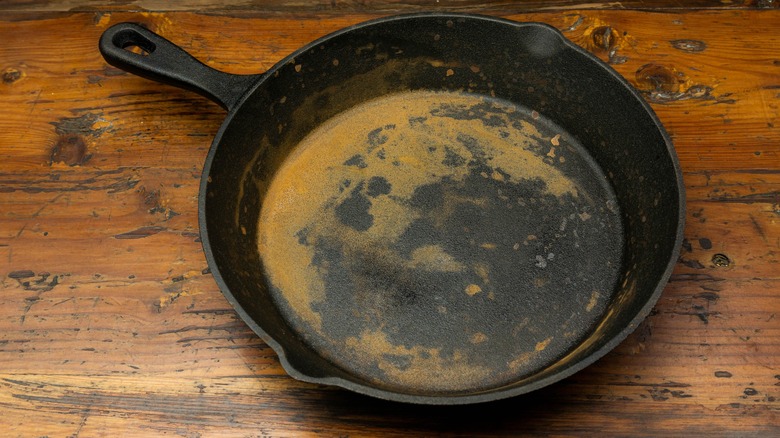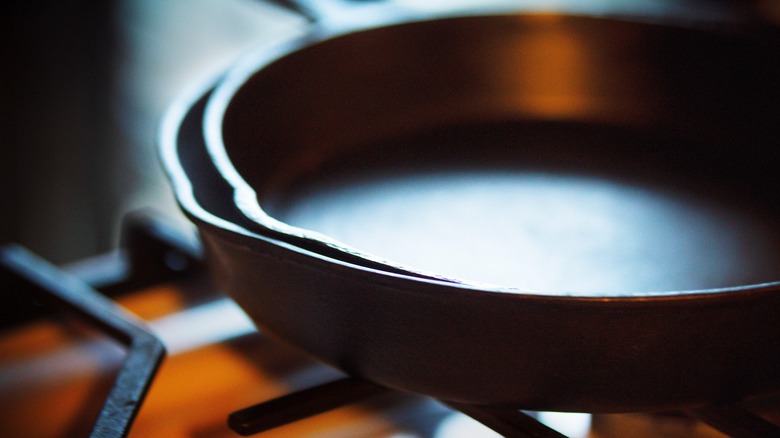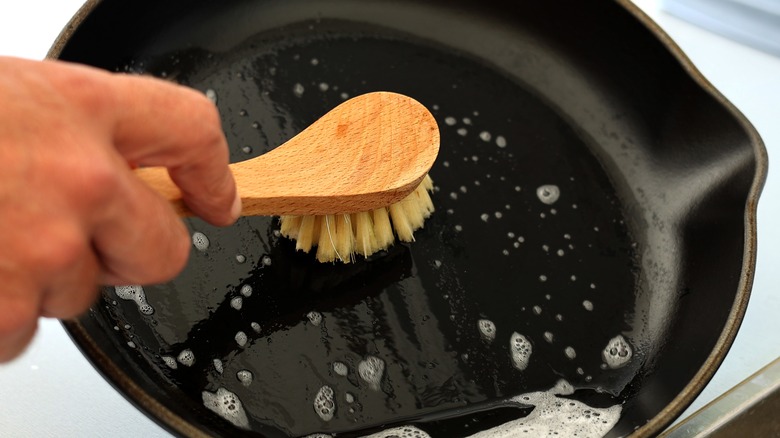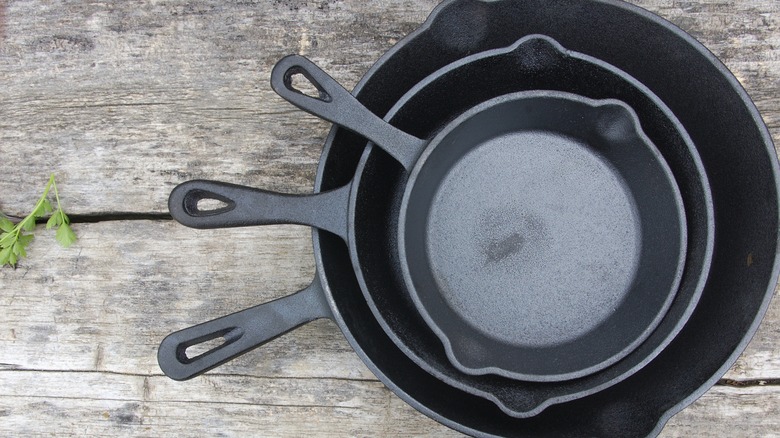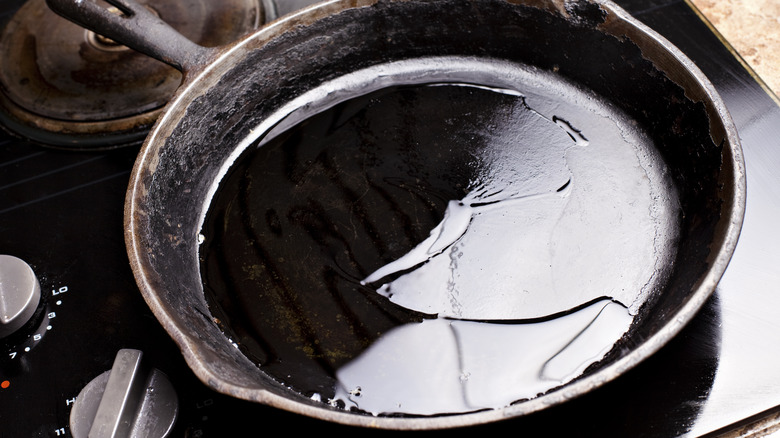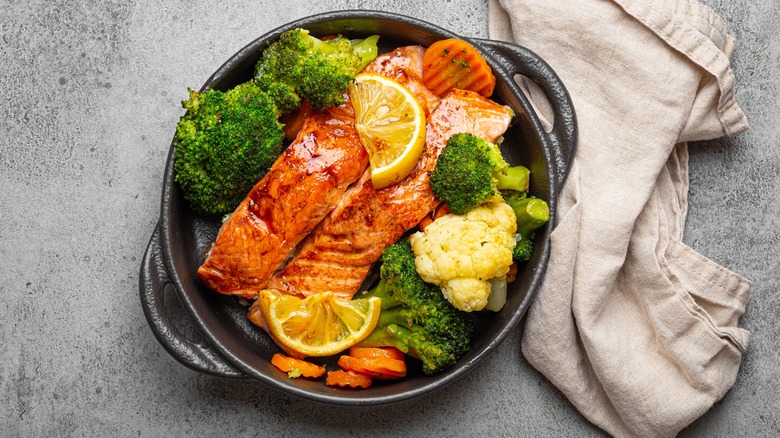5 Easy Tips & Tricks To Prevent Your Cast Iron Pan From Rusting
If there's a worse idea than picking a fight with someone who buys ink by the barrel, it might be picking a fight with someone holding a cast iron pan. To put it mildly, many people disagree in many ways about how to care for cast iron cookware. In fact, it's easy to find contradictory advice from cast iron "experts." But some solid tips eventually rise from the ashes (or maybe it's just rust and flakes of pan seasoning) of these arguments, and from that we can draw some useful conclusions about what to do and what not to do to prevent cast iron from rusting. These tips include keeping your pan seasoned, cleaning with a stiff brush, putting it away dry, oiling it consistently, and avoiding cooking acidic foods in it.
Cast iron isn't just used with cookware, of course, and other uses of cast iron come with their own ways of preventing rust. Water pump housings are often alloyed with other metals and elements to minimize rusting. The decks and tables of many benchtop and stationary tools are often made of cast iron and are treated with substances like paste wax to keep them rust-free. These options aren't available for food handling equipment, so it pays to give some thought to how you're going to prevent your favorite cast iron skillet from disintegrating.
Make sure your pan is well-seasoned
A cast iron pan is more than a chunk of metal by virtue of its "seasoning." Seasoning is a layer of carbonized oil that coats the cooking surface and transforms the iron into a nonstick surface that (combined with cast iron's ability to hold onto heat) makes cast iron pans, griddles, and Dutch ovens a dream to cook with. The other very important thing seasoning does is act as a protective coating that prevents rust by insinuating itself between the iron and moisture.
The polymerization process that creates a seasoned finish results from coating the metal with oils or fats and then transforming them at a high temperature into that smooth, black finish you expect from good cast iron. How exactly to best accomplish this is the subject of much debate, starting with which oil to use. Lodge, manufacturer of cast iron cookware, pre-seasons its pans at the foundry with vegetable oil derived from soybeans. Vegetable oil won't impart its own flavors onto other foods, and it has a moderately high smoke point. Whichever oil you use, you don't want to cook for any length of time at a temperature above that oil's smoke point or you'll get — you guessed it — smoke. The ideal is a flavor-neutral oil with a high smoke point, like safflower or light, refined olive oil (not EVOO, which has a low smoke point).
Clean it with abrasives rather than harsh detergents
If you really want to argue with a fan of cast iron cooking, talk about cleaning. Most disagreements revolve around whether you should use dish soap, and the answer is ... maybe? An ideal post-cooking cleaning wouldn't involve much water, just a little warm water along with an abrasive in the form of a scrubber like a stiff brush. Others prefer to use salt as an abrasive; it can help grab bits of food so they can be easily swept out. Some proponents of cleaning with salt swear by kosher salt, while others say plain iodized salt works fine. You can also make a cleaning paste with salt and water or high-temperature oil. If you do decide you need a little soap, make sure it's only a little, and use the mildest soap you have on hand. Even cast iron pan manufacturer Lodge says a little soap is okay, and they should know. Cleaning actually helps with rust prevention by removing food particles that might still contain moisture.
There are a couple of no-nos as well. Don't ever soak your cast iron pan in water for any length of time, as that's one of the key cleaning mistakes that ruin cast iron pans. Rely on the cleaning power of your abrasive rather than soaking, as leaving your pan submerged in water is certain to lead to rust. The other thing to avoid is your dishwasher. Hand-wash cast iron every time.
Put cast iron away completely dry
Everyone seems to agree on what happens next: to prevent rust, dry your cast iron thoroughly before putting it away. Some cast iron aficionados prefer clean paper towels or a dedicated towel (both towels and paper towels also work to prevent rusting when storing cast iron pans), which can be sufficient if your pan is well-seasoned. One of the byproducts of cast iron seasoning is a surface made smooth by bonding oils to the naturally rough surface of the iron. This smooth, hydrophobic oiled surface makes drying much easier. But don't let a seasoned pan mislead you; it's always best not to air-dry cast iron cookware.
The best approach might be the very opposite of air-drying: drying your pan using a substantial amount of heat. You can accomplish this most easily on a stovetop burner, of course, but you can also dry cast iron in the oven if you think far enough ahead to preheat. If you use a burner, avoid keeping the pan directly on high heat for very long, as it can damage the finish.
Re-season your cast iron on the fly
This is where another piece of rust-prevention magic comes into play. Experts in how to care for your cast iron pans say you should oil your pan every time you use it (after it's cleaned and dried, of course). Oiling helps to prevent any moisture in the air from reaching the cast iron, and this is a perfectly fine rust-prevention strategy. But you can take it a step further by actually heating the pan to dry it, coating it with oil, and then heating it a bit more. By following this process, you are basically contributing a little to the pan's seasoning every time you clean and dry it.
This mini-seasoning works best in an oven on high heat, and it follows that you'll want to use the sorts of oil that you'd season a pan with in the first place — something with a high smoke point and no pronounced flavor. It's trendy to use flaxseed oil for this purpose, but the oil has an exceptionally low smoke point of around 225 degrees Fahrenheit, versus 450 degrees Fahrenheit for safflower oil. It's best to use an oil like safflower, rice bran, soybean, or corn oil and leave the flaxseed oil for your salad dressings.
Avoid acidic and smelly foods
When you're actually using your cast iron to prepare food, there are a few precautions you should take to avoid damaging the finish or seasoning and to prevent rust. Conventional wisdom says to avoid cooking very acidic ingredients in cast iron because it will damage the seasoning and cause the iron to leach into food. America's Test Kitchen found that tomato sauce prepared in cast iron only developed metallic flavors after 30 minutes of cooking, so you do have some leeway. Just be sure to get the acid in, cooked, and out again as quickly as possible.
There are a few other food precautions, as well. Cast iron can hold onto flavors as well as imparting them, so it's best to avoid odiferous foods like fish. This doesn't have much to do with preventing rust, except that you'll probably find yourself washing your pan more aggressively if it smells strongly of fish. Finally, until your pan is very well-seasoned, don't use it to cook anything that has a lot of water content and requires a long time to cook. It could strip away your seasoning and jump-start the rusting process.
